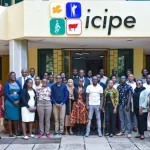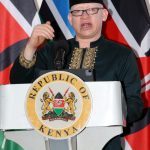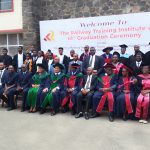PASET convened its annual meetings in Nairobi, bringing together the Governing Council, Executive Board, Advisory Group, and a High-Level Policy Dialogue on Skills Development on September 24, 2025.
By Peace Muthoka.
Nairobi – The Partnership for Skills in Applied Sciences, Engineering and Technology (PASET) convened its Regional policy dialogue in Nairobi, bringing together leaders, policymakers, and scholars to chart the future of higher education and skills development in Africa.
The summit combined all of PASET’s key governance organs, including the Governing Council, Executive Board, and Consultative Advisory Group, alongside a High-Level Policy Dialogue on Skills Development. Organizers said this integrated approach ensured strategic decisions were informed by evidence-based research and aligned with institutional priorities.
Dr. Abdou Tenkouano, Director General of the International Centre of Insect Physiology and Ecology (icipe), described the meeting as timely.
“This combined meeting represents a unique opportunity to strengthen PASET’s governance while advancing critical policy discussions on skills development in Africa,” he said.

He stressed that governance must go hand-in-hand with research outcomes to secure Africa’s future in science and innovation.
Speaking at the forum, Principal Secretary, the State Department for Technical, Vocational Education and Training (TVET),Dr. Esther Thaara Muoria, who read a speech on behalf of Cabinet Secretary Ministry of Education, Julius Ogamba warmly welcomed delegates, saying, “Karibuni sana Kenya. I encourage you to set aside some time to enjoy the Nairobi National Park, just 7 kilometers from the city, for a ‘Safari in the City’ before you return home.”
She noted the rapid expansion of higher education in Sub-Saharan Africa, while also pointing to challenges. “This expansion has increased access and skilled human resources, but it has also brought infrastructural constraints and compromised quality. PASET, through the Regional Scholarship and Innovation Fund and investments in TVET, is addressing some of these challenges,” she said.
Dr. Muoria further underlined higher education’s role in driving growth. “It fuels productivity, innovation, and entrepreneurship. Training must be learner-centered, problem-based, and digitally equipped. Stronger academia–industry linkages will ensure research translates into innovations that reduce unemployment,” she added.

Kenya’s Principal Secretary, State Department for Technical, Vocational Education and Training (TVET) Dr. Esther Thaara Muoria.
She reaffirmed Kenya’s support, saying the government remained committed to backing PASET and its flagship initiatives.
Rwanda’s Minister of Education and Chair of the PASET Governing Council, Claudette Irere, thanked Cabinet Secretary for Education of Kenya, for graciously agreeing to host this dialogue and the PASET governance meeting which initially was scheduled for Kigali.
She emphasized the importance of doctoral training. “Our universities are not only centres of advanced learning but also engines of research, innovation, and practical solutions to challenges in health, agriculture, environment, technology, and governance,” she stated.
However, she cautioned that gaps persisted. “Too often, PhD graduates face difficulties linking their research to industry, policy, and societal needs. This dialogue offers us a chance to reflect, identify challenges, and propose strategies to ensure doctoral training is relevant, impactful, and globally competitive,” she explained.
Irere urged collaboration. “Let us approach these discussions with openness and a spirit of partnership, so we leave here not just with ideas, but with clear steps to advance our shared vision for higher education and research in Africa,” she told delegates.

Rwanda’s Minister of Education and Chair of the PASET Governing Council, Claudette Irere.
Evidence-based insights were shared by Dr. Agnes Lutomiah, a research fellow at the Africa Centre for Technology Studies. She presented findings from a study on doctoral and post-doctoral training in Kenya, Rwanda, and Ethiopia.
“We found that while enrolments are rising, many students drop out due to funding shortages, work responsibilities, or family pressures,” she said. Funding, she emphasized, was critical. “Agencies like the NRF in Kenya should provide adequate grants to sustain students in PhD programmes,” she added.
She also highlighted supervision as a major barrier. “Our study found that supervision is quite a challenge in all three countries. Universities must develop mentorship frameworks that provide timely feedback and ensure active engagement, so PhDs are completed on time,” she said.
At the same time, Prof. Aminata Sall Diallo, the Chair of the PASET Executive Board, joined the Nairobi meeting virtually from Senegal, where she emphasized the crucial role of doctoral training in shaping Africa’s future.
She expressed gratitude to Kenya’s Ministry of Education and icipe for hosting the dialogue, noting that the Executive Board is fully committed to transforming strategic directions into concrete programs and results.

PASET convened its annual meetings in Nairobi, bringing together the Governing Council, Executive Board, Advisory Group, and a High-Level Policy Dialogue on Skills Development on September 24, 2025.
Prof. Diallo also highlighted the success of the Regional Scholarship and Innovation Fund, which continues to support talented African researchers and strengthen the continent’s research systems. She stressed that quality PhD training is essential in driving progress in key sectors such as ICT, food security, mining, energy, and climate change.
She urged participants to focus not only on increasing the number of doctoral graduates but also on ensuring the quality and relevance of training. According to her, this approach will deliver lasting impact and accelerate Africa’s long-term development.
Dr. Lutomiah further raised gender concerns. “In Kenya, about 80 percent of PhD candidates are male compared to only 20 percent female. Funding agencies should design targeted support for women to encourage their participation,” she recommended.
Delegates expressed optimism that the discussions would shape policy reforms and concrete actions. With diverse voices and a united vision, participants agreed that PASET’s initiatives could align higher education with Africa’s labor market needs and unlock the continent’s potential in innovation and economic growth.










[…] PASET Summit in Nairobi Calls for Stronger Higher Education and Skills Development in Africa. […]